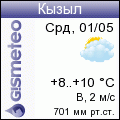|

Kyzyl Weather
| |
A Few Words About Words
Me, again.
So, the portion of the e-mail that I sent out last dealing with the Tuvan language was pretty inaccurate, insufficient, and unfair. Also, in the week since I last wrote, I have learned quite a few new things about the language (the revelations never cease), so I'm going to try to make another go at it. No yaks this time, just a healthy dose of language terms, some of which I'm making up as I go along. Don't read this right after lunch, you'll probably fall asleep.
One of the first things that really struck me about Tuvan (perhaps because of my background: studying Greek and Latin at Oberlin of all places) is it's absolute lack of gender. English is gendered at least enough to have different words for 'him' and 'her.' In Tuvan, I can talk about a friend of mine back home and, unless I specify, there is no way of knowing what their gender is. A far cry this is from Russian, which even gives gender to some of its verbs. For those Latin students among you, learning Tuvan has been a great exercise in all those aspects of Latin that we typically don't understand: the lack of articles, the 'backward' word order, heavy declension.
Thankfully for my studies (though unfortunately for local literature), abstract thought is not a major feature of the language. Only recently have I begun to notice the occasional substantival adjective and relative clauses are all but absent. Of course, this may simply be a result of my limited understanding, but I don't think that any original Platonic dialogues will ever be written in Tuvan. Instead, the Tuvans have a remarkable number of ways to describe and discuss concrete events and objects. More on that later.
Of course, the hardest (and funnest) part about learning Tuvan comes from it being a Turkic language. Having studied Greek, Latin, and French and dabbled in Italian and German, I spent the first month of my time here trying to recognize Indo-European stems in what people were saying. In Italy, I was able to understand a fairly good deal of what people were saying this way, but here the practice bore very little fruit. Also, as a Turkic language, Tuvan is extraordinarily suffix-happy (thanks for the warning, Keith). The stem 'chygaa,' meaning 'speech' can be lengthened to form the verbs 'chygaalar' (to speak), 'chygaalazhar' (to speak with), or 'chygaalazhaksar' (to want to speak with). Each time you learn a new suffix, you can effectively double your verb vocabulary; the trick then is learning in what order to use the suffixes.
As for aspect, I must correct what I said before. The day after I last wrote, I met with Valentina Suzukei, my main language teacher. We have regular joint lessons in English and Tuvan and she is working on learning the English perfect (I have spoken, I had spoken, etc.) It seems that Tuvan doesn't have a direct parallel to the perfect aspect. As far as aspect goes, it does make a distinction between the simple (I speak) and the progressive (I am speaking). The third main aspect falls somewhere between these two --- something like 'I am being in a state in which I speak,' though a clean translation is impossible. Adding more auxiliary verbs further nuances this, allowing some really fun combinations --- all of which provides hours of entertainment as I try to learn new ways to think about verb aspect.
In my last writing, I made the cardinal sin of blurring the line between the perfect aspect and the past tense (sorry, Mr. Helm). The past tense is where Tuvan really becomes incredible. When I last met with Valentina, we wrote out every form of the past tense that we could think of --- everything from 'I read the book' to 'for a while I was wanting (you) to read the book (to someone else).' We ended up with 27 different forms. Distinctions in the past tense are made according to the amount of time spent doing something ('I flipped through it' is a form of 'I read,' as is 'I read it, but it took a long time' and 'I read it very quickly'), as well as the number of people affected by the action. This last bit is a nuance of the supplementary verb, allowing you to create verbs like 'I read the book to someone else' and 'I recommended that you read the book.' All these forms in two words or fewer.
I'm not going to try to tackle the future tense right now. The typical future form is nothing more than the simple present (also the infinitive) which reminds me of Mr. Helm's idea of the future tense as a late addition to the language, growing out of the aorist (simple) form. That much is easy --- now I am beginning to learn that several past tense forms double as future tense forms. Maybe I'll write more about that in April.
The day after I last wrote we had our first snow. Then, on Saturday evening, it was foggy and the fog froze overnight, turning the world into the crystalline fairy tale that you expect from Siberia. Today is remarkably warm --- last I checked, the temperature was right at the freezing point (which, in true winter spirit is reported as 'negative zero degrees'). Kyzyl in winter (at least, so far) is remarkably lively. The market is going strong and the disco clubs still pump out their extraordinarily loud music, which, thankfully, is actually better now than it was in the summer. Maybe I'm just getting accustomed . . .
More stories as they come.
-s
|


